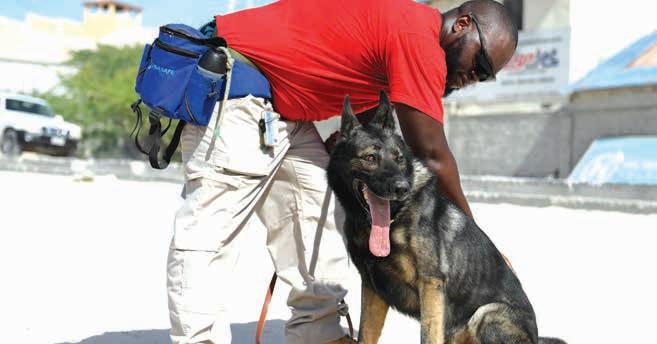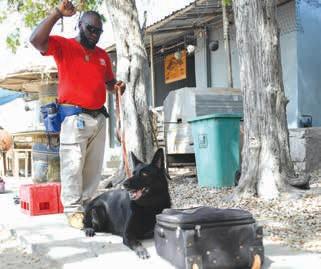
3 minute read
More than Partners: The Relationship Between EDD and their Handler
Often dogs are described as man’s best friend, but they are more than that in the context of peace and security operations. They work side by side with the women and men working and providing security in difficult environments. Explosive Detection Dogs (EDD), play an important role in preventive security by providing explosive detection capability and deterrence.
Advertisement
In Somalia, the EDDs play a key role in mitigating the threat of explosives. As part of UNMAS support to AMISOM, UNMAS provides EDD teams to ensure security and protection at key facilities in Somalia. These teams provide detection capability at entry control points, government facilities, airports and security checkpoints. In May 2019, UNMAS EDD teams searched 48,916 vehicles and 30,049 pieces of luggage in the capital Mogadishu and the Federal Member States.
An Explosive Detection Team is comprised of two trained dogs and a dedicated handler. Together, they conduct searches for a variety of explosive materials in different environments. They develop a strong bond and friendship as a team. Through the years, handlers develop a good understanding of the behavior and personality of their dogs. EDD’s communicate with their handlers using behavioral signals that the handlers recognise.
“I work with two dogs, Tony and Flabio. I have been working with them for three years now. I have gotten to know their different behaviors and personalities. Flabio is stronger and faster. He is more confident. Whereas, Tony is easy-going and quiet,” says Andrew Mironga, who works as an EDD handler for SafeLane Global in Somalia.
Handlers are also responsible for providing the basic care and welfare for their dogs including grooming, feeding, daily health checks, bathing and exercising. They also conduct regular training exercises to keep the dog fit and increase stamina. These exercises are designed to assess the EDD’s effectiveness in detecting explosives.
As part of UNMAS’ quality assurance procedures, each handler maintains a log book to check the fitness of the EDDs. Each day, handlers take their dogs for exercise and daily walks. They provide ample time for the dog to play and rest. This structured routine helps the dogs stay healthy and fit. Handlers check on them daily, making sure they are up to the task in detecting explosives. Handlers must recognise the physical and psychological comfort of their dogs to assess their ability.

“These dogs do an important job. They keep me and other people safe. We cannot underestimate their value. To keep fit and alert, I and my team constantly look after them. We have a daily and weekly routine. If I am not on duty working with my dogs on site, I am here feeding, grooming, and playing with them. This routine has become second nature for me,” added Mironga.

Like in other workplaces, communication is crucial in achieving productivity. EDDs communicate with handlers through behavioral cues. Different dogs use different behavioral signals when they detect anything suspicious. Some signal the presence of anything suspicious by sitting near a suspected explosive device; other dogs kneel. These cues alert the handlers to that EDD found something suspicious. Good understanding between handler and dog, results in increased levels of detection accuracy.











